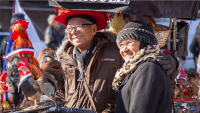Thriving Aging Societies
Social Engagement and Societal Infrastructure

Program in Thriving Aging Societies: Social Engagement and Societal Infrastructure
This program is dedicated to the knowledge creation and solutions for transforming societies to successfully age, where longer lives are lived with health and people of all ages benefit from being an aging society, and aging societies are thriving societies. The Aging Society Network, led by Dr. Rowe, has defined the following as key elements of thriving societies of longer lives: equity, cohesion, wellbeing, productivity and engagement and security. The key elements to creation of thriving societies for long lives will be design and investment in the health systems that can best create healthy longevity and meet needs in older age, and in the building of new opportunities through which older people can remain engaged in society and contribute in ways they value, whether through paid work or volunteer service. This will require innovations in societal institutions to design out loneliness and enable the social engagement and social capital, meaning, purpose and beneficial impact of longer lives, and bring dignity to older age and value to all of society. Redesign of environments so that they support wellbeing at all ages is also critical. The evidence indicates that the whole of society transformation to societies that support wellbeing at all ages will be ones that fully benefit from the contributions of older adults and assure that younger generations flourish. These transformations will create a previously unimagined Third Demographic Dividend.
Linda P. Fried, MD, MPH
Dr. Fried is a geriatrician, gerontologist and epidemiologist who has led major population-based studies to define opportunities for prevention of cardiovascular disease, multimorbidity, frailty and disability in aging. Her work defining frailty as a clinical syndrome supports the understanding that engagement and activity as one ages is a vehicle to maintaining health across all dimensions, physical, cognition and socioemotional. In the 1990’s she codesigned and co-founded Experience Corps, a senior volunteer program created to demonstrate the immense value of the un-enabled capabilities and social capital of older people in our aging society. Experience Corps is an evidence-based public health program united with senior service, designed with experts in early child development, and offers a novel societal institution that deploys trained older adults as volunteers in public elementary schools in roles created to support the academic success of all children in grades Kindergarten-3. This program demonstrates that societal institutions designed to enable older adults to be generative and to utilize the many capabilities that accrue with age, and to create positive for communities through collective efficacy, offers a vehicle for wellbeing in aging and for thriving of society. Dr. Fried has proposed that the untapped social capital of older people, if enabled in the context of longer health span in older age, could constitute a basis for a Third Demographic Dividend for all ages. Dr. Fried is the co-chair of the recently published U.S. National Academy of Medicine Global Roadmap for Healthy Longevity (insert link), offering the blueprint for transformation to successful societies of longer lives.
John W. Rowe, MD
Dr. Rowe, the Julius B Richmond Professor of Health Policy and Aging, is a geriatrician / gerontologist who has focused his academic work on Successful Aging at the level of the individual and, more recently, societies. In the late 1980’s Dr Rowe formed and led the decade-long MacArthur Foundation Research Network on Successful Aging an interdisciplinary group of twelve scholars who worked to understand the factors that permit individuals to age successfully. With Robert Kahn, Rowe formulated the Successful Aging concept which has been the basis of substantial research in the field. In 2007 Dr Rowe formed and led the MacArthur Network on an Aging Society which continues to the present and is an inter-disciplinary group of fourteen scholars working together to understand the critical factors that permit societies to adapt to the demographic transformation. As discussed above this work has led to development of an Aging Society Index which quantifies societal progress across key domains. The Index was initially developed for OECD countries and more recently has been extended to over 130 countries. Recent work has elucidated changes in societal adaptation over time, and across the individual States in the US and has examined the relationship between societal adaptation and gender as well as important geriatric issues including depression.
Key Citations
Chen C, Goldman D, Zissimopoulos J, Rowe JW & Research Network on an Aging Society (2018) Multi-dimensional comparison of countries’ adaptation to society aging. PNAS, 115(37), 9169-9174. doi: https://doi.org/10.1073/pnas.1806260115
Fried LP (2016). Investing in health to create a third demographic dividend. The Gerontologist 56(2 Suppl): S167-S177. [ISBN 978 92 4 069481 1]
Fried LP (2016). Building a third demographic dividend: strengthening intergenerational well- being in ways that deeply matter. Public Policy & Aging Report 0:1-5. [doi:10.1093/ppar/prw015].
Fried LP, Carlson MC, Freedman M, Frick KD, Glass TA, Hill J, McGill S, Rebok GW, Seeman T, Tielsch J, Wasik BA, Zeger S (2004). A social model for health promotion for an aging population: initial evidence on the Experience Corps® model. Journal of Urban Health 81(1):64- 78. [PMID: 15047786]
Rehkopf D, Furstenberg FF, Elser H, Jackson C, Levy N, Rowe JW and the Aging Society Network. A U S State Index of Successful Aging Differences Between States and Over Time. Milbank Quarterly November 23, 2021. doi.org 10.1111/ 168-0009.12542